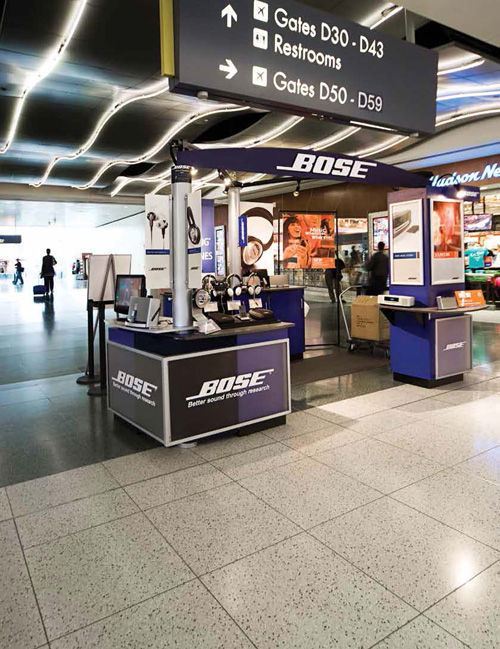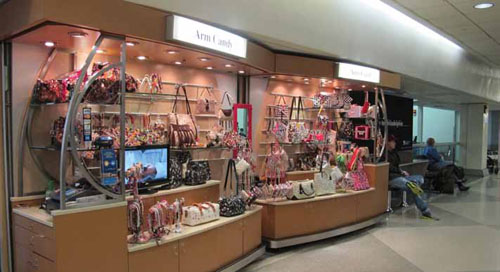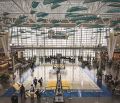Airports Use Carts & Kiosks to Boost Concession Revenues
The movie Field of Dreams popularized the notion that "If you build it, they will come." But some airports are taking the corollary approach - not building additional concessions space - and customers and vendors still continue to come.
How are they leveling the playing field and staying in the game? By recruiting concessionaires that sell from pushcarts, kiosks and vending machines.
At McCarran International Airport (LAS) in Las Vegas, 13% of last year's overall concession revenues were produced by 12 self-service vending units and 46 standalone carts and wall-unit kiosks. LAS officials hope to grow such revenue streams even more in the future.
In December, the county board authorized the Clark County Department of Aviation to hire a firm to develop, lease and manage a "Business Incubation Program" at LAS. The new pushcart concession program aims to give small retailers a foothold at the airport without the costs associated with developing a traditional inline store. The program is also designed to provide local companies with short-term, flexible leasing agreements to test new business ideas.
The concept behind LAS' incubation program isn't new. Like many airports, it has operated a kiosk program since the 1980s. "Since inline store space is limited, kiosks are more affordable for small business operators and are a very practical way to add to the airport's offering of food, beverage and retail options," says Clark County director of aviation Randall H. Walker. "They are also an additional non-airline revenue source."
Space-Saving Alternative
Marketplace Philadelphia has operated the concessions program at Philadelphia International Airport (PHL) for more than 15 years. Early in the relationship, Marketplace recognized the value of specialty retail in an airport setting, says company president Clarence LeJeune.
Some areas of an airport simply lack the space needed for concession build-outs or would require millions of dollars for renovations, explains LeJeune. At LAS, for instance, airport officials report that expanding concessions may require eliminating a gate, which isn't always feasible.
"We see the specialty retail program as an opportunity to backfill services and retail offerings we couldn't offer otherwise because of limited space," LeJeune says.
Marketplace Philadelphia finds that specialty retail kiosks offer small, local businesspeople an inexpensive way to enter the airport space - a move many budding entrepreneurs might otherwise find intimidating. "It is a great opportunity for a smaller, local guy to get into a larger retail environment. You don't necessarily need 15 years of retail experience or a business degree to do it," says LeJeune.
Kathy Hussey, who owns an inline store and operates two Las Vegas Fruits & Nuts kiosks at LAS, agrees: "You can get a product line in there fairly easily, and it can be very extensive or very limited." Hussey notes that it's less expensive to build, stock and operate a kiosk, and the return on those investments can be high.
Less-daunting leases (often month-to-month or seasonal) also make kiosks attractive options for potential operators. PHL offers leases as short as 30 days, though its average is three months.
"If you wanted to sell scarves but weren't sure if the concept would work, we could mutually agree to test it for 30 days then look at sales and gauge customer response," LeJeune says. "The beauty of the program is that it doesn't bind businesses to three-, five- or seven-year deals. And it doesn't require a significant investment in bricks and mortar."
By working with local businesses, the airport also showcases the community's retail offerings. A local artist who makes jewelry or hand-painted accessories may not be able to make a go of it in an inline store, but might thrive in a kiosk, LeJeune explains.
Kiosks also provide a testing ground to determine whether or not a concept might thrive in an inline store. "There have been a couple of situations here where we've had a cart open inline stores at the airport and in other airports across the country," he reports.
 The Passenger Connection
The Passenger Connection
Airport customers provide an attractive audience for potential vendors. Last year, LAS hosted more than 41 million passengers and PHL had 30.8 million travelers pass through.
"There are very few malls in this country that can boast 31 million or 41 million people coming through every year," LeJeune says. "Not only is the customer base dense, but it's economically sound."
Air travel, he explains, attracts professionals with expendable income who often have time to spare during delays and layovers. "And, their purchases are often impulsively based," he adds.
An airport's so-called "captive audience" doesn't guarantee instant success, warns Hussey. To make her fruit, nut and popcorn kiosks inviting to customers, Hussey leverages the smell of warm caramel popcorn and roasting cinnamon nuts. She also employs a bright lighting and color scheme. "You have to have a good-looking kiosk to draw people in," she advises.
Vendor Search
At LAS and PHL, officials seek entrepreneurs with prior business experience, solid business plans and the financial wherewithal to carry their concessions concepts to fruition.
Marketplace Philadelphia sponsors outreach programs in the community to locate qualified local vendors, networking with minority groups and canvassing shopping malls, gift shows and fairs to uncover new kiosk product lines.
"We look for unique concepts," says LeJeune, noting that they don't bring in concepts that compete with existing inline tenants or other retail merchandising units.
Both airports require budding entrepreneurs to present their business proposals through the request for proposal (RFP) process. Hussey notes that details in vendors' RFP responses must be exact and meet local building requirements. "Airports want experienced people with retail experience and a good idea," she says.
PHL also requires potential kiosk operators to detail how they will market their products and pay for their investment. A business needs inventory, insurance, two months rent, a security deposit, business license and the capacity to pay for employee fingerprinting and background checks.
The Right Mix
Though TSA regulates the products sold at post-security outlets, the list isn't as restrictive as some might think. Most retail and food concepts easily pass muster. However, merchandise must still be relevant to customers. "We look for travel-related items and for things that might be impulsively purchased," notes LeJeune. "And we look for something that's manageable after the traveler makes the purchase. The products must be something travelers can get on the plane and to their final destination in one piece."
The fare offered at LAS' kiosks range from skin care products to snacks to T-shirts. PHL's 39 units also include both retail and food concessions. 'We sell smaller items passengers can carry on their flights with them," says LeJeune. "Typically, trendy accessories, gifts and souvenirs, seasonal crafts, handmade products and electronics work well in that environment."
The traveling public often assumes products sold at airports include predatory markups. But the terms of kiosk programs at LAS and PHL preclude it.
Both airports require business owners to follow a "street-pricing" policy that prevents them from charging higher prices for similar items sold at regional stores. LeJeune explains an airport Gap store cannot charge $50 for a blouse that retails at $40 in an area mall.
The policy at LAS is slightly different, because it requires business owners to keep prices consistent with the Las Vegas Strip. Hotels and shops in the resort corridor generally price differently (i.e. higher) than "street pricing."
Location, Location, Location
Officials at LAS base their decisions about kiosk placement on space availability, passenger traffic and passenger demographics.
Typically, retail merchandising units are placed in corridors passengers use to travel to and from their gates, and purchases become incidental to that walk/journey, says LeJeune.
Passenger demographics also come into play. LAS, for instance, locates its Bose kiosk in the D Concourse, where it does "extremely well," because the majority of the airport's business travelers - the demographic Bose appeals to - pass through this area. If the same kiosk were moved to an area where Southwest Airlines operates, it would likely not perform as well, because the passengers make up a different demographic, explain airport officials.
it does "extremely well," because the majority of the airport's business travelers - the demographic Bose appeals to - pass through this area. If the same kiosk were moved to an area where Southwest Airlines operates, it would likely not perform as well, because the passengers make up a different demographic, explain airport officials.
Not Always a Smooth Flight
Operating in an airport presents unique considerations for businesses. The hours can be long and the hiring process more restrictive than operators are accustomed to, notes LeJeune.
"The RMU program runs from 7 a.m. to 10 p.m., 365 days a year," he explains. "Unlike malls that are closed holidays or early on weekends, we are open every day."
Airports also require kiosk operators to badge employees, a process that can take two weeks and screens workers with a federal background check that includes FBI fingerprinting. The system may seem like overkill for clerks selling magazines or pretzels, but it helps keep airport security high. A class covering airport safety and security procedures is necessary for workers to receive their badges.
To ensure that concessions have enough workers to cover absences and other scheduling blips, PHL and LAS require kiosks to employ at least four people.
Differences in customer behavior necessitates longer, more thorough employee training, adds Hussey. Because airport shoppers are often in a hurry to catch flights, staff must be trained to work efficiently and quickly - a situation complicated by the nature of a kiosk itself. People generally enter inline stores from one direction. At a kiosk, notes Hussey, customers come from all directions and a single employee must notice each one quickly or risk losing a sale.
Hussey requires a minimum of two weeks training with an experienced employee to familiarize new hires with the airport environment.
PHL offers business owners quarterly training seminars and visits from secret shoppers every other month to provide feedback about service via its Cutting Edge (Excellence Drives Great Experiences) merchant incentive program.
 Serve Yourself
Serve Yourself
Challenges aside, specialty retail is a growing trend at some airports. And certain units don't even require clerks. Automated concepts from ZoomSystems and other providers are popping up at many locations.
PHL has limited space for self-service units and currently operates two Nanny Caddy machines and two ZoomSystems units. But LeJeune predicts that will change in the future.
LAS currently has 12 self-service kiosks from ZoomSystems, including Best Buy units stocked with electronics and other machines selling Clinique skin care products.
Like kiosks and carts, only time will tell if self-serve retail keeps the customers coming.
FREE Whitepaper
PAVIX: Proven Winner for All Airport Concrete Infrastructure
International Chem-Crete Corporation (ICC) manufactures and sells PAVIX, a unique line of crystalline waterproofing products that penetrate into the surface of cured concrete to fill and seal pores and capillary voids, creating a long lasting protective zone within the concrete substrate.
Once concrete is treated, water is prevented from penetrating through this protective zone and causing associated damage, such as freeze-thaw cracking, reinforcing steel corrosion, chloride ion penetration, and ASR related cracking.
This white paper discusses how the PAVIX CCC100 technology works and its applications.








